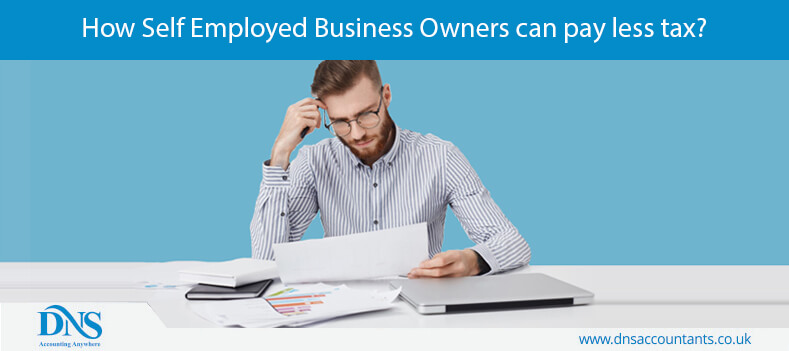Many people saw the dream of being a self-employed person but they are not clear about the facts that after becoming a self-employed person, you will not only receive perks but also receive many challenges or obstacles along with it.

While setting up your own business, you must have a good understanding of filing self-assessment tax return, working of tax deductions, tax avoidance schemes and ultimately declaring your income correctly to HMRC. We have seen that in most of the cases, challenges related to taxes are faced by the self-employed business owners that end up in paying penalties to HMRC.
- Claim all allowable expenses
- Pension contributions
- Making donations to charity
- Incorporate your business
- Use tax return software
Methods of minimising or paying less tax
There are various methods by which self-employed business owners can minimise or pay fewer taxes –
-
Claim all allowable expenses
– Self-assessment form allows you to list all your business expenses which you can claim later on as a self-employed individual. Other than tax avoidance schemes, there are various tax relief measures offered by HMRC to self-employed business owners for claiming work-related expenses.
Good understanding about business expenses can help in reducing your tax bill which varies depending on the business nature. Some of the business expenses which you can claim and help in reducing your tax bill are as under –- Office equipment
- Business insurance
- Electricity
- Uniform
- Travel payments (Mileage, residence)
- Business group membership subscription
- legal costs etc.
To see the full list of business expenses you can claim as a self-employed business owner, click here.
-
Pension contributions
– You can also avail tax relief on pension contributions by topping up your pension pot. If you are a self-employed person and contributing into a pension pot at the higher rate of 40%, you can receive tax relief from the government by declaring these contributions later in your self-assessment form. You can put up to £40000 annually as a contribution into the pension pot and can claim 20% of the tax relief.Also See: Pensions Tax Relief Explained -
Making donations to charity
– If you are making good profits and paying tax at a higher rate of 40%, then addition of any donations towards charity in your tax return can help in reducing your tax bill. This will benefit higher rate taxpayers more as they can claim extra tax relief. -
Incorporate your business
– Incorporating your business can also benefit you in lowering down your taxes. If you have just started your business or working as an established sole trader from few years. It’s better that you should opt for incorporating your business.
Once you have noticed an increase in the size of your business, incorporating your business as a limited company can help you in reducing the taxes. As a director of an incorporated business, you can easily withdraw part of your earnings as dividends, resulting in payment of tax at a much lower rate (7.5% for basic rate tax-payers) than income tax. As a self-employed individual, you can receive tax-free dividend income up to £2000 (As per the change in April 2018)
-
Use tax return software
– In today’s world, manual processing of tax returns have taken a back seat and tax return submission via software has been preferred by most of the self-employed business owners. Tax return submission via software not only helps you in reducing manual errors but also helps in submitting your tax returns directly to HMRC in just a few clicks.
Softwares like Nomisma benefit self-employed individuals in creating and recording income, payments, sale and purchase generated or received by your business. It can easily manage all your business finances in real-time and provides a clear picture of your business.
In case you are having any query or want specialist advice on "How self-employed business owners can minimise tax", kindly call us on 03330886686 or you can also e-mail us at enquiry@dnsaccountants.co.uk
Also See: How Can a Self-Employed Get a Mortgage Certificate?
Any questions? Schedule a call with one of our experts.



_Let_Property_Campaign_-_HMRC_Tax_Disclosure_Guide.png)




